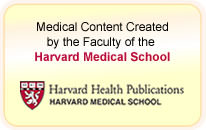
Conditions in Depth
This page contains the basic information about Gastroesophageal Reflux Disease (GERD) .
Return to the Gastroesophageal Reflux Disease (GERD) Main Condition Center
Diagnosis
Your doctor will ask you:
-
How often you have heartburn or other symptoms of GERD
-
Whether your symptoms are worse when you lie down or bend over
-
Whether your symptoms are relieved by over-the-counter heartburn remedies
Your doctor also will review your current medications. Some medications can loosen the esophageal sphincter. These include:
-
The asthma medicines theophylline or albuterol
-
Blood pressure or heart medications such as calcium channel blockers and nitroglycerin
-
Muscle relaxants
-
Anxiety medicines
-
Medicines for an overactive bladder
-
Migraine medicines
-
Medicines to treat diarrhea
-
Medicines that reduce the amount of saliva you produce, such as antihistamines and antidepressants
Pain that feels like heartburn also can be a symptom of coronary artery disease. Your doctor may ask whether you have any symptoms of heart problems. He or she may test for heart problems.
If your only complaint is mild heartburn and your physical examination is normal, your doctor may suggest lifestyle changes and over-the-counter medications. You may not need any special diagnostic testing or prescription treatment.
If you have more serious symptoms, or if your heartburn is not relieved by medications, you will need further testing. Serious symptoms include severe, long-lasting heartburn, difficulty swallowing or weight loss.
The best test for GERD is an endoscopy. The doctor looks directly at your esophagus with an endoscope. This is a flexible tube that can be passed through the mouth and throat. Endoscopy is usually is done by a gastroenterology specialist.
During endoscopy, your doctor may take a small sample of tissue to be examined in a laboratory. Your doctor also may look at your stomach and first part of the small intestines with the endoscope.
You also may have one or more of the following tests:
-
Barium swallow — An X-ray test that outlines the esophagus.
-
Cardiac evaluation — To check for heart disease.
-
Esophageal manometry or motility studies — To check the squeezing motion of your esophagus when you are swallowing.
-
Esophageal pH monitoring — Uses electrodes to measure the pH (acid level) in the esophagus. It is usually done over a 24-hour period.
From Health A-Z, Harvard Health Publications. Copyright 2006 by the President and Fellows of Harvard College. All rights reserved. Written permission is required to reproduce, in any manner, in whole or in part, the material contained herein. To make a reprint request, contact Harvard Health Publications. Used with permission of StayWell.